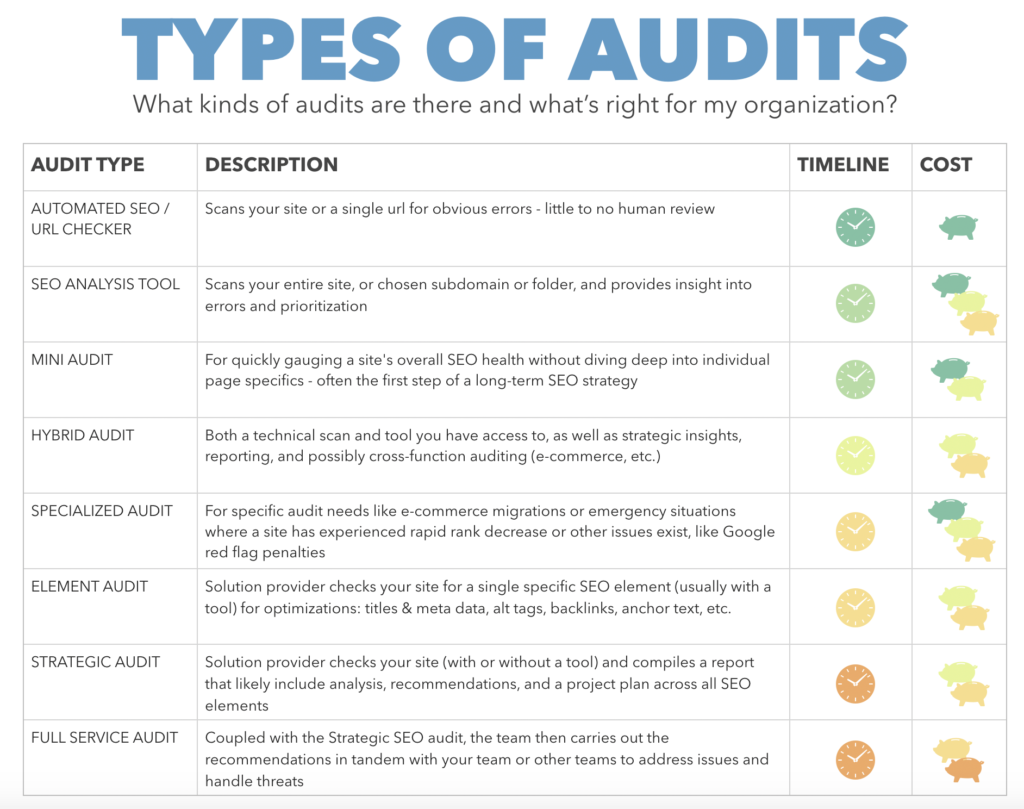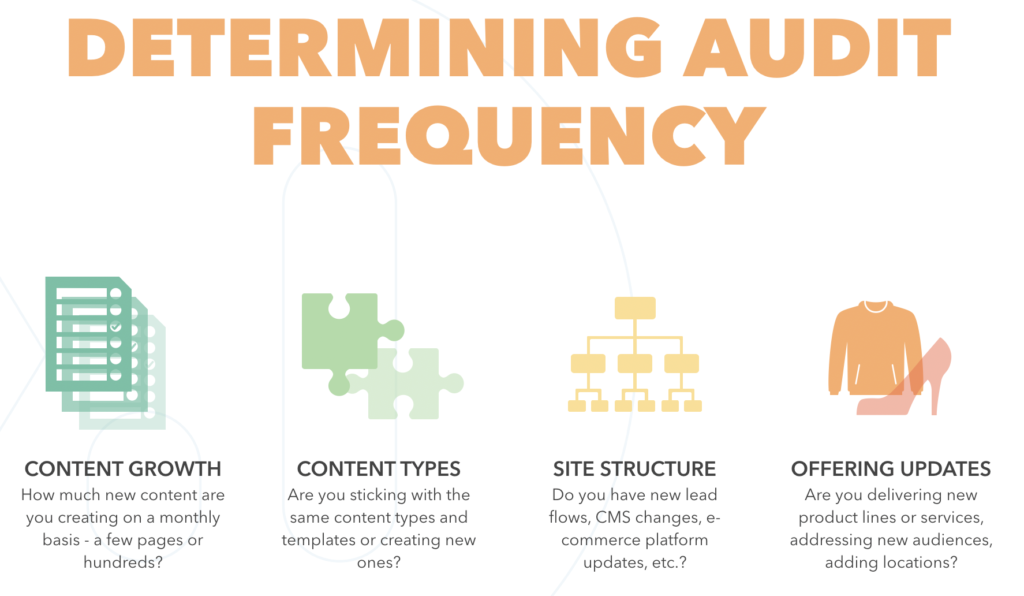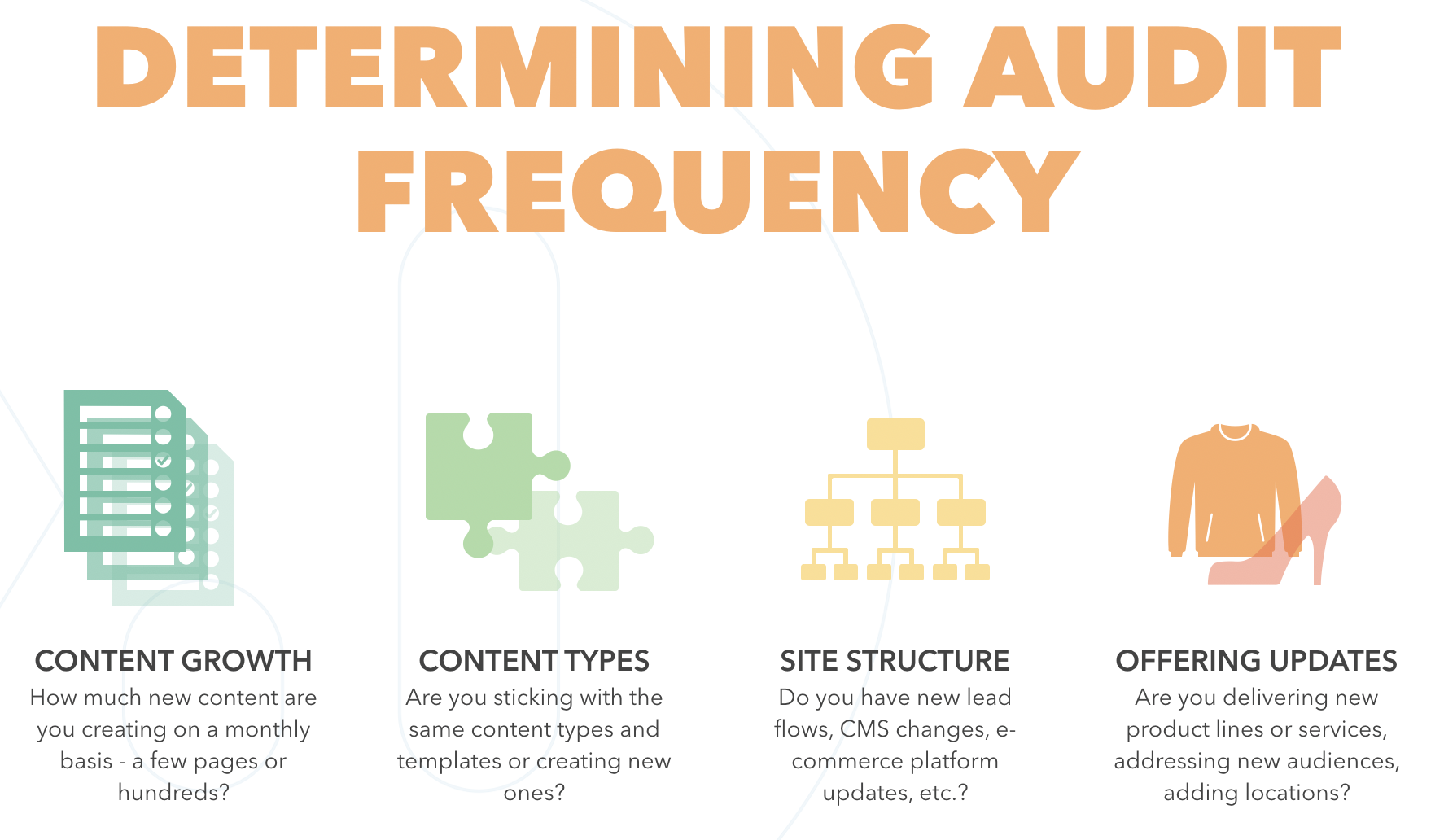Welcome to the third week of our series on strategic SEO auditing! This week, the conversation turns from concept to execution. We’re discussing frequently you should perform SEO audits on your content, and the delegation of the audit itself and action items uncovered by the audit.
In previous posts, we’ve covered the value of SEO audits for your business, eight types of SEO audits and how to determine which your business needs, the timeline for an audit, and the types of deliverables you may expect to create or receive. Check back to Week 1 and Week 2 of this series for a refresher!
How often should you audit your site?
We often talk about site audits as the trailhead on a journey to good SEO: you find issues on the site (and offsite), then fix them – turning your site’s performance around in the process. But, site audits aren’t a one-time kickoff event. Today, we’re talking about establishing a regular site audit practice, and utilizing needs-based audits on an as-necessary basis. A healthy site audit practice will reduce reactionary resource spend — those instances when you’re putting out fires because something is broken, and you’re losing rank, traffic, and income in the process. Auditing as maintenance will head off unnecessary traffic loss, and cut down on issues with market targeting and competition.
As a refresher on the types of SEO audits available, let’s run through the eight audits we’re talking about in this series:
- An automated SEO / URL checker scans your site or a single URL for obvious errors, without much human review. These are low-time, low-cost checks of your site.
- An SEO analysis tool or platform will scan your entire site, or a chosen sub-folder, and provide insight into any errors. It’s similar to a URL checker, but may scan more pages and provide prioritization insight, telling you what fixes need to happen first.
- A mini audit quickly gauges a site’s overall SEO health without delving into the health of individual pages. It can serve as great first step into SEO strategy.
- A hybrid audit provides a technical scan and tools to access on an ongoing basis, as well as specialized reporting, strategic insights, and possibly some cross-function auditing. By purchasing a hybrid audit, you would have access to the tool used to scan the site, and your SEO agency would also provide and human insight into the site’s health.
- A specialized audit will include information covering specific audit needs, maybe in the case of an e-commerce migration, or an emergency situation in which you’ve seen a sharp traffic decrease. Specialized audits are perfect for triaging sharp decreases in revenue due to technical issues or Google red flag penalties.
- An element audit will cover one specific SEO element, such as meta tags or site indexes, usually using an automated tool. It’s rare that you would want to use only an elemental audit, but they can help you mine a list of all pages affected by one specific element.
- A strategic SEO audit is an all-encompassing SEO audit. With this type of audit, your solution provider checks your site and compiles a report including analysis, recommendations, and a project plan across all SEO elements. They might include competitor or market analysis, or look at offsite elements. These audits might use a tool, or they may be done manually.
- A full service audit: A full-service audit includes everything provided in strategic SEO audit, as well as help actually carrying out that SEO plan. It will set up a long-term relationship with your service provider wherein they will help monitor your SEO performance, perform keyword research for you, and actually make (or suggest) updates to the site.

So, how frequently should you be auditing your site? Determination of your audit frequency can be determined by four key things:
- Content growth: How much new content are you creating? Think about what goes up on your site on a month basis. Is it a few pages or hundreds of pages? What types of pages are those — informational posts, product pages, image pages?
- Content types: Are you sticking with the same content types and templates, or creating new ones? If you’re duplicating templates, you may be able to get away with auditing less frequently, but if you’re making new content types, you’ll want to assess those as they’re rolling out and afterward.
- Site structure: Are you trying out a new lead flow or landing pages, or have you changed or updated your platform? If so, you’ll want to check in frequently to make sure that the new structure is working for you.
- Offering updates: Any time you add new product lines, services, or locations, you should stay on top of auditing the performance of those new offerings. That type of maintenance will ensure that new pages are followable and ensure that you’re covering the keywords that will bring that new audience to your site.

Okay, really: how often should I perform site audits?
The above factors – content growth, content types, site structure, and the frequency with which you update your offerings – will all play into the frequency with which you should audit your site, and your budget and staffing levels may play into your decision to audit more or less frequently. However, we can offer a few general guidelines by site type.
Our general rule of thumb is that any large brand, especially one that adds significant content volumes to their site regularly, should conduct a mini audit every month and a strategic audit twice per year. Chances are, your site is a main (or the sole) source of revenue and lead gens, so you want to stay on top of its performance!
Ecommerce sites with lots of products or multiple distribution sites (retail locations or distributors like Amazon, Target or Jet) should conduct a specialized audit every month and a strategic audit every year. Specialized auditing can help check up on your competition and, again, if you’re relying on your site for lead generation — and to get your leads in front of your product — you should check on the site as often as possible.
An information-only or brochure site may get away with auditing less frequently, especially if new content isn’t being added. However, remember that your site – even a site with no new products or services – is still battling competition for the top SERP position. And, even if you think you don’t have competition in your field, site auditing can ensure that your site functions properly, and that users are having a positive experience with your site. For small-scale websites, we recommend a strategic audit once per year, along with audits whenever major changes are implemented to the site’s structure or platform.
There are plenty of occasions, even for low-content sites, when a site audit is absolutely necessary. Let’s go through some of those situations:
- Before launching a new website or subdomain, all new pages should be audited within the dev environment. A pre-launch audit gets out ahead of potential issues before they become real-life problems! These pre-launch audits aren’t only about crawlability; we’re looking at findability, site structure, and usability overall. A full-service audit or a series of specialized audits should look at your keyword targeting, site map, and content across the site.
- Before going live with major site changes, restructures or page reconfigurations, you should have another full-service or strategic audit. Anything that affects the site holistically needs to be examined through the lenses of SEO and UX.
- Before implementing new templates and content types, an element audit can ensure that those templates are optimized prior to launch. Those new templates should be checked for findability before you replicate and populate them.
- When Google announces major algorithm updates, auditing to ensure site compliance with any new ranking factors is a must! Stay on top of Google’s rollouts and check out any guidance they publish about updates.
- If your site has suddenly lost substantial organic traffic or dropped in rankings for primary keywords, specialized audits can identify and address the root causes of those declines. This is that emergency triage we discussed earlier in the post!
- When migrating CMS platforms or e-commerce platforms, specialized audits can work to mitigate the impact of those changes on SEO.
- Adding a new geographic market or language to your site? This is the perfect time to do both a specialized and a strategic audit to ensure that search engines are receiving the correct language and location signals from your site.

Rank Tracking & Competitor Insights Delivered Daily
Who should perform my site audits?
Determining who will conduct your audit (or audits!) and who will carry out the resulting recommendations can be just as important as choosing the correct audit type and frequency. Your audit partner will help you ensure that your content is delivering on the intent of your users’ queries, and they’re the front line of your findability plan.
A good audit partner, whether a service provider or an internal group, will format appropriate reporting and deliverables, help you navigate best SEO practices, and find efficiencies for repeat auditing. They should:
- Be detail-oriented in their review of the site. With each issue or opportunity they uncover, your audit partner should dig into what may be causing those issues – and, which issues are actually affecting your performance.
- Understand current best SEO practices, tools, and trends – including changes in the SEO ecosystem through this very week. You want your SEO partner to find the most efficient, up-to-date tools and understand Google’s most recent updates.
- Know your goals and KPIs, and will map back to them. An understanding of what counts as a conversion for your organization is key! The goal of a small non-profit website new clients will be vastly different than the goals of a large department store seeking new customers.
- Can create deliverables in a format that works for your team, whether those are interactive tools, spreadsheets, in-person reports, whatever. Different employees or agencies may create different types of reporting. Check out last week’s post on types of deliverables and insights you should be receiving.
- Are willing to educate your team on findings and next steps. Even if your dev department or technical team is part of your SEO crew, you want your audit’s findings to be understood by everyone in the room.
- Will continue to be a resource after completion. If you’re using an SEO checker, this may be as simple as setting up the tool to be available to you after the initial check. If you’re doing a full-service audit or hybrid audit, you should have a contact person to handle additional support and questions after the audit.
- Can find efficiencies for repeat audit needs. If you’re doing a mini audit every month, or a full audit every six months or year, you’ll want to create an efficient way to build on the knowledge gleaned through previous audits.
- Knows the different types of audits and which is right for you. Don’t choose a partner that’s selling you on the biggest type of audit! You want to work with someone who can specialize an audit as necessary.
- Understands organic’s role in the overall marketing ecosystem. Your resource should help you understand how offsite and paid content contributes to organic, and vice versa.
- Is transparent about pricing, expectations, and what you’ll get for what you pay.
Using your internal resources
What parts of an audit should be outsourced, and what can be done internally? There are three major things you need to consider: your team’s abilities, your timeline, and your budget.
Abilities: We recommend using internal personnel to handle the use of automated SEO checkers and SEO tools. Those tools are made to be used by internal teams, and someone in your group should be trained on using them so that they can be used for monitoring. For mini-audits and hybrid audits, your team may be able to do those in-house – if you have employees with advanced SEO skills. If you do choose to use an internal person for these roles, make sure the person or group of people is up to date on the latest in SEO, content marketing, and overall marketing trends.
Timeline: How much time can your team put in on auditing? Will those employees be doing audits in conjunction with other daily tasks? Remember that time will be allotted not only to active auditing, but to choosing and using an audit tool, creating deliverables, prioritizing tasks, and creating a timeline for fixes. You’ll also want to allow time for employees to follow up on the changes you’ve made and assess the success of those changes.
Budget: Make sure you’ve determined the budged for tools that you need, additional employees for assistance during or after the audit, and development time for fixes that need to be made. It can be easy to forget that our team members’ time is money – and that you may need help from other teams!
Assessing your external resources
We seriously recommend working with an agency for specialized or element-based audits, strategic audits, and full-service audits. Even if your team is packed with SEO pros, figuring out deliverables and a process for creating them can take a ton of time. Also, sometimes agencies will have access to tools at lower rates than you can buy as a single entity.
What you’ll look for in an external resource will be similar to what you’ll seek in any SEO auditing partner. However, we can offer a few tips on making sure an agency will fit with your organization:
- Make sure they offer the right audit type for you. A provider trying to fit your needs into the template they use for hundreds of other clients won’t be worth your money. Here at Demandsphere, we address specific site issues and organizational goals to determine the type of audit we’ll create for each individual client.
- Set clear deliverable expectations. You should have an idea of what reporting you’ll receive and when. You should see examples of the deliverables you’ll receive, understand how often you’ll receive them, and get to know the contact person with whom you’ll have meetings and check-ins.
- Make sure your contract doesn’t have hidden costs. You want to know exactly what you’re paying for, and your agency should be open about questions or concerns! Don’t enter into an agreement to let the agency find issues on your site, then charge an unknown sum to fix those issues (this happens…a lot).
- Understand the amount of follow-through the agency will provide. Are they going to keep up with results and recommendations for your site after the audit, or are they going to leave you on your own to assess their performance? We provide our clients access to regular reporting and always-available site tools. If you want something similar, make that clear!
- Find out if the agency offers repeat efficiencies and packages. Ideally, your contractor should work with you on timing for additional mini-audits, full service audits, and other needs.
Consistent auditing should help you make the most of your budget by making the auditing faster for your auditing partner. Perhaps more importantly, regular auditing will create efficiencies by preventing issues before they happen. As your audits uncover common issues across your site, they’ll help you build in fixes to new templates, content, and pages so that you’re not repeating the same mistakes. Issue prevention is really at the heart of site auditing.
Next week, we’ll recap what we’ve learned in this four-part series. Check back in and we’ll talk about audit goals and KPI tracking, audit types and timelines, and expectations and for deliverables!

